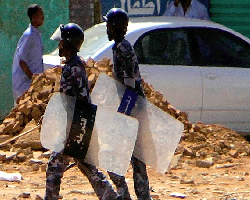A student who was beaten by police during violent anti-government demonstrations in Khartoum, Sudan's capital, has died of his wounds in Omdurman hospital, protesters have said.
"Mohammed Abdulrahman, from Ahlia University, died last night in Omdurman hospital as a result of his ... wounds after he was beaten by police," said an activist who took part in Sunday's protests.
"This morning (Monday) both Ahlia University and the Islamic University of Omdurman have been closed by a government decision," said the activist, speaking on condition of anonymity.
Two other students said Abdulrahman had fallen during the clashes and was taken to the hospital, where medics informed them that he had died early on Monday.
"Medical sources confirmed to us that the student died yesterday from his injuries inflicted by security forces," said Yasir Arman, the top official in the north of south Sudan's main party, the Sudan People's Liberation Movement (SPLM).
Arman condemned the use of force and said the students were trying to hold peaceful demonstrations.
The Omdurman hospital morgue declined to comment on the death.
Witnesses said at least six universities in the capital and Sudan's regions were surrounded on Monday by hundreds of heavily armed police, preventing students from leaving the grounds.
University students in three towns in the north tried to escape to protest but were quickly arrested or beaten back by armed police, they said.
'Martyr'
Sunday's demonstrations followed calls by the "30 January" Facebook group for Sudanese youth to take to the streets and stage peaceful anti-government rallies across Sudan.
The Facebook group, which has around 17,000 members, confirmed Abdulrahman had died, referring to him as a "martyr" who followed in the footsteps of another student killed in the October 1964 popular uprising that toppled the military regime then in power.
"Al-Gorashy was a martyr for us. And you are our martyr now, Mohammed Abdulrahman," it said in large red lettering.
Protesters on Sunday were confronted by a heavy police presence in different parts of Khartoum and Omdurman, and in El-Obeid, about 600km west of the capital.
The ensuing clashes resulted in at least 64 arrests and left many wounded.
Ali Osman Taha, Sudan's vice-president, on Monday echoed earlier statements by senior Sudanese officials that the government does not fear popular protest of the kind that has shaken the government in Egypt but said such actions must be "within the law".
"The government is not afraid of anything. Freedom exists within the law, and anyone who wants to express himself has to do so within the law," Taha told a news conference in Khartoum.
Another senior member of the ruling National Congress Party branded Sunday's protests "illegal and isolated".
"These protests were illegal and isolated, and the political parties behind them were acting in an illegal way and this is not accepted," Rabie Abdul Ati told the AFP news agency.
'Revolution against dictatorship!'
The demonstrations came after nearly a week of turmoil in Egypt, and coincided with the first complete preliminary results from this month's vote on independence for south Sudan, which confirmed a landslide for secession.
In Omdurman, just across the Nile from Khartoum, around 1,000 demonstrators shouted slogans against Omar al-Bashir, the president, and hurled rocks at riot police, who retaliated with tear gas and batons.
At the medical faculty of Khartoum University, security officers tried to prevent about 300 student protesters from leaving the campus, but they eventually forced their way out onto the street, shouting: "Revolution against dictatorship!"
Police and security officers attacked them with batons, arresting several and forcing the students back inside the university compound, which was later surrounded by more than 20 police trucks.
On Monday, journalists said security forces prevented the opposition Ajras al-Huriya and the independent al-Sahafa newspapers from being distributed after they wrote about the protests.
"Security came to the printing press and stopped the paper going out," said Fayez al-Silaik, deputy editor of Ajras al- Huriya, adding his paper was targeted because it had a front page article on the protests.
Dozens of students including two sons of opposition politician Mubarak al-Fadil were arrested and many remain detained, activists and opposition officials said on Monday.
Widespread economic and political discontent has provoked sporadic street protests in north Sudan in recent weeks, with the security forces maintaining tight control in Khartoum.
Like Egypt, Sudan is also deep in economic crisis after a bloated import bill has eaten up foreign currency and forced an effective currency devaluation which sparked rising inflation.
This month the government cut subsidies on petroleum products and sugar, a key commodity in Sudan, sparking smaller protests throughout the north.
PHOTO CAPTION
Sudanese riot police patrol the streets of Khartoum
Al-Jazeera


 Home
Home Discover Islam
Discover Islam Quran Recitations
Quran Recitations Lectures
Lectures
 Fatwa
Fatwa Articles
Articles Fiqh
Fiqh E-Books
E-Books Boys & Girls
Boys & Girls  Ramadan
Ramadan Fatwa Audios
Fatwa Audios Month of Mercy
Month of Mercy Women
Women Eed Al- Fitr
Eed Al- Fitr Food Recipes
Food Recipes Videos
Videos

 Prayer Times
Prayer Times












